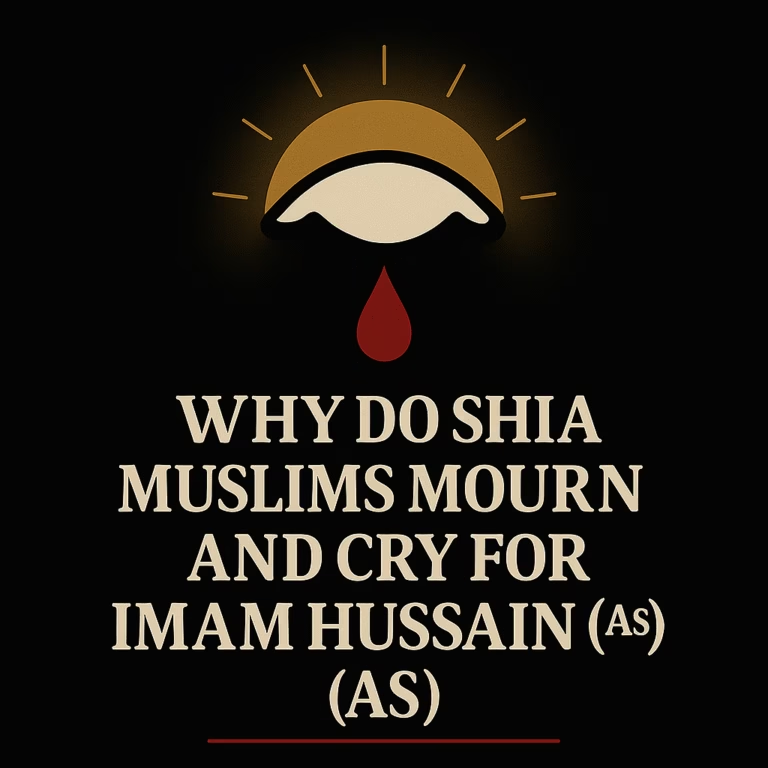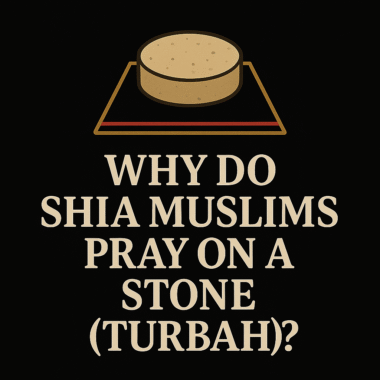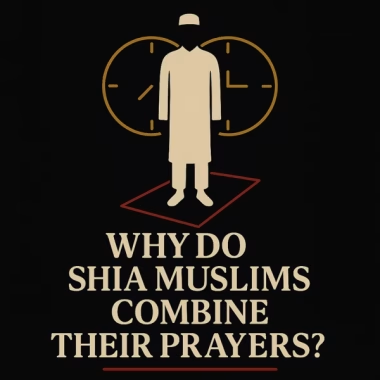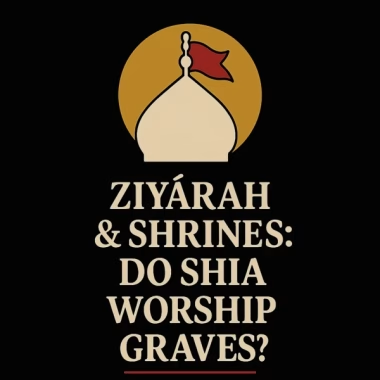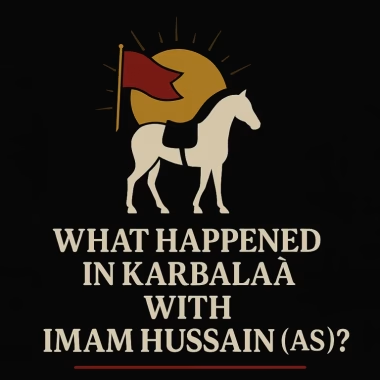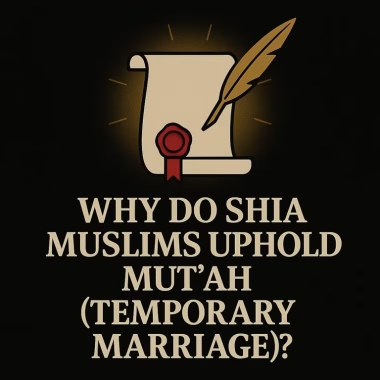Shia Muslims mourn Imam Hussain (AS) because the Prophet ﷺ loved him deeply, foretold his martyrdom, and himself wept over him. Mourning Hussain is not despair or sectarianism, but love for the Prophet’s family, grief over injustice, and a way to keep alive the values of truth, justice, and resistance against oppression.
Explanation
Grief and tears are natural expressions of love and faith, affirmed by the Qur’an and the Sunnah. The Prophet ﷺ himself wept for his loved ones and specifically for Imam Hussain (AS). Karbalāʾ was not only a tragic event but also a defining stand of truth over tyranny, and mourning it is a way to remember and renew that moral stand. The Qur’an praises those who honour Allah’s signs (22:32) and commands remembering the Days of Allah (14:5). Shia mourning — through majālis (gatherings), tears, Qur’an recitation, duʿāʾ, and charity — is rooted in this remembrance. It is not about rejecting patience or creating division but about embodying the Prophet’s love and standing with the oppressed.
Evidence
1) Qur’anic Foundations of Mourning
- Grief is human and faithful
Arabic: ﴿وَتَوَلَّىٰ عَنْهُمْ وَقَالَ يَا أَسَفَىٰ عَلَىٰ يُوسُفَ وَابْيَضَّتْ عَيْنَاهُ مِنَ ٱلْحُزْنِ فَهُوَ كَظِيمٌ﴾
English: “He turned away from them and said, ‘Alas for Joseph!’ and his eyes turned white from grief, for he was suppressing [his sorrow].”
📖 Reference: Qur’an 12:84 - Remembrance of divine events
Arabic: ﴿وَذَكِّرْهُم بِأَيَّامِ ٱللَّهِ﴾
English: “Remind them of the Days of Allah.”
📖 Reference: Qur’an 14:5 - Honouring sacred symbols
Arabic: ﴿وَمَن يُعَظِّمْ شَعَائِرَ ٱللَّهِ فَإِنَّهَا مِن تَقْوَى ٱلْقُلُوبِ﴾
English: “Whoever honours the symbols of Allah—indeed, that is from the piety of hearts.”
📖 Reference: Qur’an 22:32
📌 Karbalāʾ is one of the Days of Allah — an eternal symbol of standing for truth.
2) Prophetic Sunnah of Weeping
- Weeping is mercy, not weakness
Arabic: «إِنَّ الْعَيْنَ تَدْمَعُ وَالْقَلْبَ يَحْزَنُ وَلَا نَقُولُ إِلَّا مَا يَرْضَى الرَّبُّ»
English: “The eyes shed tears and the heart grieves, but we say only what pleases our Lord.”
📖 Reference: Ṣaḥīḥ al-Bukhārī 1303 - Permission to visit graves
Arabic: «كُنْتُ نَهَيْتُكُمْ عَنْ زِيَارَةِ الْقُبُورِ فَزُورُوهَا»
English: “I had forbidden you from visiting graves; now visit them.”
📖 Reference: Ṣaḥīḥ Muslim 977a
📌 Mourning and visiting graves were both permitted and encouraged by the Prophet ﷺ.
3) The Prophet’s ﷺ Love for Imam Hussain (AS)
- Arabic: «حُسَيْنٌ مِنِّي وَأَنَا مِنْ حُسَيْنٍ، أَحَبَّ اللّٰهُ مَنْ أَحَبَّ حُسَيْنًا»
English: “Hussain is from me, and I am from Hussain. Allah loves whoever loves Hussain.”
📖 Reference: Jāmiʿ al-Tirmidhī 3775 - Arabic: «الحَسَنُ وَالحُسَيْنُ سَيِّدَا شَبَابِ أَهْلِ الجَنَّةِ»
English: “Hasan and Hussain are the leaders of the youth of Paradise.”
📖 Reference: Jāmiʿ al-Tirmidhī 3768; Sunan Ibn Mājah 118 - Arabic: «مَنْ أَحَبَّ الْحَسَنَ وَالْحُسَيْنَ فَقَدْ أَحَبَّنِي، وَمَنْ أَبْغَضَهُمَا فَقَدْ أَبْغَضَنِي»
English: “Whoever loves Hasan and Hussain has loved me, and whoever hates them has hated me.”
📖 Reference: Musnad Ahmad 7876 (Arnaʾūṭ ed., Musnad Abī Hurayrah); also in Sunan Ibn Mājah 118
📌 Loving Hussain is loving the Prophet ﷺ himself.
4) Prophecy of Karbalāʾ & The Soil
- Jibrīl told the Prophet ﷺ of Karbalāʾ
Arabic: «إِنَّ جِبْرِيلَ أَخْبَرَنِي أَنَّ هَذَا (الْحُسَيْنَ) يُقْتَلُ بِأَرْضٍ يُقَالُ لَهَا كَرْبَلَاءُ»
English: “Jibrīl informed me that this (Hussain) will be killed in a land called Karbalāʾ.”
📖 Reference: Musnad Ahmad 648; al-Ṭabarānī, al-Muʿjam al-Kabīr 3:107 - The Prophet ﷺ wept over Karbalāʾ soil
Arabic: «أَخَذَ رَسُولُ اللّٰهِ ﷺ تُرْبَةً مِنْ كَرْبَلَاءَ فَشَمَّهَا ثُمَّ بَكَى»
English: “The Messenger of Allah ﷺ took soil from Karbalāʾ, smelled it, and wept.”
📖 Reference: Musnad Ahmad vol. 6, p. 294 (Anas route); al-Ḥākim, al-Mustadrak 4:398; al-Ṭabarānī, al-Muʿjam al-Kabīr 3:107–109 - Umm Salama’s vial
The Prophet ﷺ gave her Karbalāʾ soil saying it would turn to blood when Hussain was killed.
📖 Reference: Musnad Ahmad vol. 6, p. 294 (also numbered 25943 in some prints); al-Ḥākim, al-Mustadrak 4:398; al-Ṭabarānī, al-Muʿjam al-Kabīr 23:289
📌 If the Prophet ﷺ wept for Hussain, his Ummah’s mourning is continuation of his Sunnah.
5) Misconceptions Addressed
- “Crying shows lack of sabr.”
❌ False. The Prophet ﷺ cried (Bukhārī 1303). Tears are mercy, not protest. - “Annual mourning is bidʿah.”
❌ False. The Qur’an commands remembrance of Ayyām Allāh (14:5). Sunnis commemorate ʿĀshūrāʾ by fasting. Structured remembrance through majālis is Sharia-compliant. - “Focusing on Hussain is sectarian.”
❌ False. The Prophet ﷺ said, “Hussain is from me and I am from Hussain” (Tirmidhī 3775). Qur’an 33:33 and 42:23 elevate Ahlulbayt. Mourning is about justice, not partisanship. - “Karbala remembrance causes division.”
❌ False. Division comes from injustice, not remembrance. Mourning unites around justice, compassion, and truth.
6) Shia Hadith Encouraging Tears
- Imam al-Riḍā (AS):
Arabic: «يَا ابْنَ شَبِيبٍ، إِنْ بَكَيْتَ عَلَى الْحُسَيْنِ… غَفَرَ اللّٰهُ لَكَ كُلَّ ذَنْبٍ»
English: “O son of Shabīb, if you weep for Hussain until your tears flow, Allah will forgive all your sins.”
📖 Reference: al-Amālī (al-Ṣadūq); Kāmil al-Ziyārāt, ch. 32 - Imam al-Ṣādiq (AS):
Arabic: «مَنْ أَنْشَدَ فِي الْحُسَيْنِ بَيْتًا فَبَكَى وَأَبْكَى… فَلَهُ وَلَهُمُ الْجَنَّةُ»
English: “Whoever recites a verse about Hussain and weeps, causing others to weep — Paradise is for him and them.”
📖 Reference: Kāmil al-Ziyārāt, chs. 33–34
Conclusion / Summary
Mourning Imam Hussain (AS) is rooted in Qur’an, Sunnah, and Shia hadith. The Prophet ﷺ himself loved Hussain, foretold his martyrdom, and wept over him. Shia tears are not rejection of sabr, but love, remembrance, and solidarity with the oppressed. Mourning keeps alive the values of Karbalāʾ — justice, truth, and dignity — making it an act of faith.
Quick FAQ
Q: Do Shia mourn to reject Allah’s decree?
No. Mourning is mercy, not objection. The Prophet ﷺ himself cried for his loved ones.
Q: Why every year?
The Qur’an commands remembering Ayyām Allāh (14:5). Karbalāʾ is such a day of Allah, to be remembered forever.
Q: Isn’t it sectarian?
No. The Prophet ﷺ centred love for Hussain. Mourning him is following the Prophet’s Sunnah.
References
- Qur’an — 12:84; 14:5; 22:32; 33:33; 42:23.
- Ṣaḥīḥ al-Bukhārī — 1303 (Prophet ﷺ wept: “the eyes shed tears…”).
- Ṣaḥīḥ Muslim — 977a (permission to visit graves).
- Jāmiʿ al-Tirmidhī — 3768 (Hasan & Hussain leaders of youth of Paradise), 3775 (“Hussain is from me…”).
- Sunan Ibn Mājah — 118 (Hasan & Hussain, leaders of youth of Paradise).
- Musnad Ahmad ibn Ḥanbal — 648 (prophecy of Karbalāʾ), 7876 (Arnaʾūṭ ed., “Whoever loves Hasan and Hussain has loved me,” Musnad Abī Hurayrah), vol. 6 p. 294 / 25943 (Umm Salama’s vial of soil; numbering varies).
- al-Ḥākim, al-Mustadrak — 4:398 (Prophet ﷺ smelled Karbalāʾ soil and wept; Umm Salama’s soil report).
- al-Ṭabarānī, al-Muʿjam al-Kabīr — 3:107–109 (prophecy of Karbalāʾ), 23:289 (Umm Salama’s soil narration).
- al-Amālī (al-Ṣadūq) — Imam al-Riḍā (AS) on forgiveness for tears over Hussain.
- Ibn Qulawayh, Kāmil al-Ziyārāt — ch. 32 (Imam al-Riḍā (AS) hadith), chs. 33–34 (Imam al-Ṣādiq (AS) on reward for poetry and tears).

